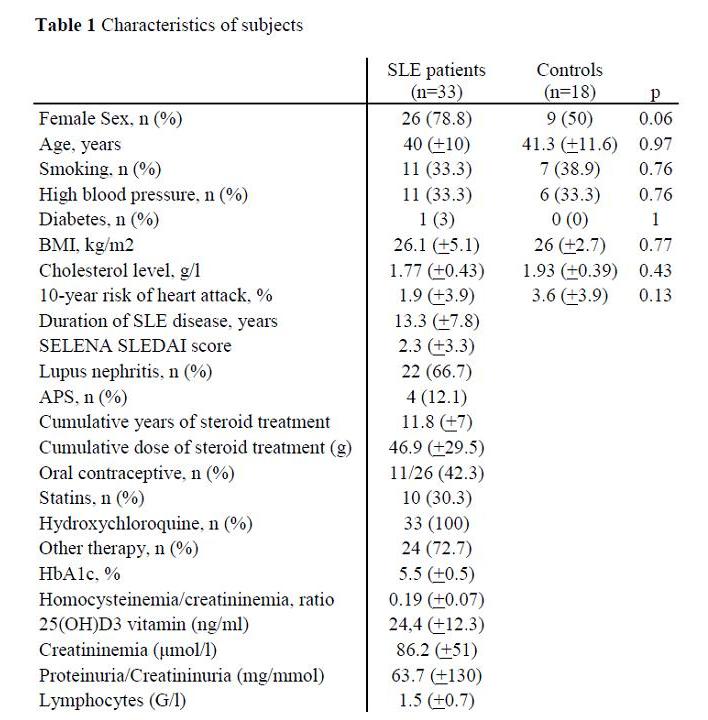Session Information
Session Type: Abstract Submissions (ACR)
- Background/Purpose:
The mechanisms for accelerated atherosclerosis in SLE remain unclear. As atherosclerosis is itself immune-mediated, features of SLE-associated immunity might explain accelerated cardiovascular disease beside traditional cardiovascular risk factors.We studied the relationship between T cells expressing CXCR3, a chemokine receptors involved in transendothelial migration, and subclinical vascular disease as assessed by common carotid intima-media thickness, internal carotid wall thickness, pulse wave velocity and pulse pressure measurements in SLE patients.
- Methods:
The expression of CXCR3 on PBMCs was measured by flow cytometry in 33 SLE subjects asymptomatic for cardiovascular diseases (CVD) and 18 controls. Patients with SLE were assessed for vascular disease with common carotid artery intima-media thickness (IMT), internal carotid artery wall thickness (ICWT), pulse wave velocity (PWV), and pulse pressure (PP) as well as for SLE disease history, corticoid exposure and classical risk factors for cardiovascular disease.
- Results:
All SLE subjects had received long-term glucocorticoid and 24 (73%) were still under prednisone at a mean daily dose of 8.7 ± 2.6 mg/day. All were receiving hydroxychloroquine. Twenty-four had been treated with immunosuppressive or immunomodulatory drugs during follow-up. Four patients also had APS. Classical cardiovascular risks distribution did not differ between controls and SLE patients (Table 1).
SLE-subjects displayed a higher frequency of circulating CD4+ T cells (35.1±17.7 vs 23.6±8.4%; p<0.05), CD8+ T cells (72.4±19.5 vs 44.9±14.9%; p<0.005), NKT cells (56.9±19.1 vs 31.3±18.8%; p<0.001) and B cells (24.5±16.1 vs 12.4±5.9%; p<0.05) that expressed the chemokine receptor CXCR3, as compared to controls.
The mean IMT was 0.54 (±0.12) mm in SLE subjects. The mean internal carotid artery wall thickness (ICWT), pulse wave velocity (PWV), and pulse pressure (PP) was 1.34 (±0.74) mm, 7.1 (±1.65) m/s and 54.7 (± 13.3) mmHg, respectively.
In SLE subjects, infraclinical vascular disease -assessed with IMT (r2=0.15, p=0.02), ICWT (r2=0.12, p=0.04), PWV (r2=0.12, p=0.04), and PP (r2=0.23, p=0.004)- correlated with expression of CD4+CXCR3+ on T cells. CD4+CXCR3+ T cells were shown to be antigen-primed CD45RA–CD27+/- and to produce high levels of TNF-α upon polyclonal TCR activation..
No significant association was found between peripheral expansion of CD4+CXCR3+ T cells and traditional (Framingham score, LDL-cholesterol), non-traditional (HbA1c, homocystein, 25(OH)-D3 vitamin; creatinine blood levels) cardiovascular risk factors or SLE-related risk factors (duration of disease, glucocorticoid therapy, SLEDAI score, renal function).
- Conclusion:
Our study suggests that CD4+CXCR3+ T cells are instrumental in SLE-associated atherosclerosis.
Disclosure:
K. Sacre,
None;
B. Escoubet,
None;
N. Charles,
None;
A. Dossier,
None;
M. P. Chauveheid,
None;
T. Papo,
None.
« Back to 2013 ACR/ARHP Annual Meeting
ACR Meeting Abstracts - https://acrabstracts.org/abstract/expansion-of-cd4cxcr3-t-cells-in-patients-with-systemic-lupus-erythematosus-sle-correlates-with-subclinical-atherosclerosis/

